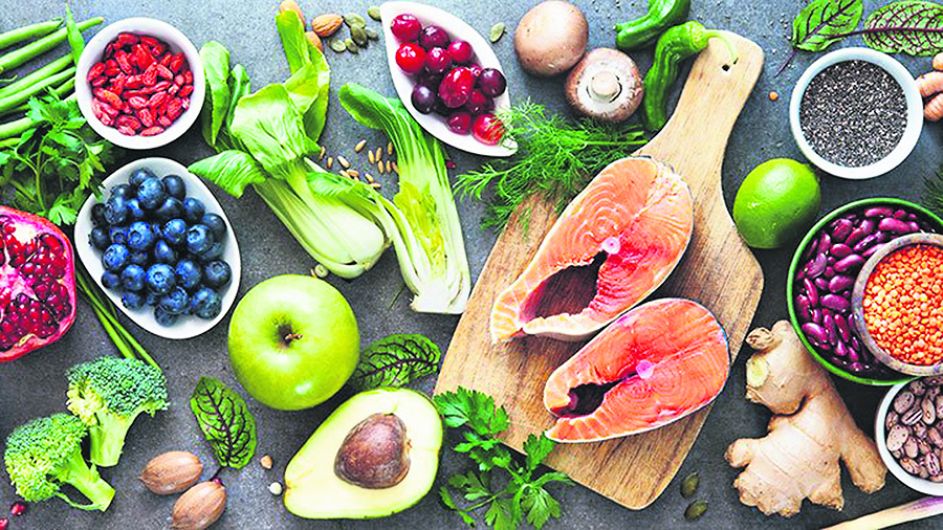With this being Irish Heart Month, I've rounded up an overview of all the latest news, starting with yet more evidence that a Mediterranean style diet is the optimum
Health & Nutrition with Rosie Shelley
WITH this being Irish Heart Month, I’ve rounded up an overview of all the latest news, starting with yet more evidence that a Mediterranean style diet is the optimum. A major study found that eating more in the way of vegetables, fish, nuts, olive oil and whole grains cuts the chance of an early death from cardiac issues by 37%.
The emphasis here is firstly on oily fish: regular consumption can reduce the risk of heart failure or stroke by a third and of associated deaths by 30%.
One study even said that it will cut your chances of a heart attack in half. And then there are the plants: we’re now recommended to eat 10 portions a day (including two of fruit) for a 24% to 33% lower incidence of heart disease, stroke and premature death.
Hard to beat beetroot
But just the old five a day still carries significant benefits, so do what you can. Particularly helpful are the dark green leafy veg and broccoli of the cabbage family—those eating the most had the least thickening in the arteries that can lead to stroke.
And beetroot contains 20 times more nitrates (which converts to nitric oxide) than any other vegetable, the compound that relaxes artery walls improving blood flow and so lowering blood pressure.
The Mediterraneans love their garlic, which is another superfood for the heart. It makes the blood less ‘sticky’, dilates the arteries, and reduces tension in the blood vessels by 72%. if you don’t like the taste, good garlic supplements can cut blood pressure by a healthy 10%.
And those nuts, especially walnuts and almonds, can lower bad cholesterol by 5%, while their vitamin E is a powerful cell protective antioxidant.
Other research shows that those eating nuts just once or twice a week had a 20% lower risk of heart failure, while those eating more had a significantly lower risk of irregular or fast heartbeat.
When it comes to whole grains and heart health, one of your best options would be oats.
Their particular kind of fibre binds with cholesterol in the gut so that it’s passed out and can lower bad cholesterol by nearly 20%.
According to the World Health Organisation, people eating lots of fibre are much less likely to develop heart disease and stroke (amongst other things like diabetes and several cancers).
Start the day with porridge
Experts say a daily bowl of porridge could have the same effect as taking statins. Oats also feed the good bacteria in the gut and help us feel fuller for longer, both of which are vital for controlling weight. Which is good news in a week that brought us the news that obesity rates in this country increased more than in any other European country over the last recorded 37 years, and that our consequent mortality rates due to obesity are second only to America.
Being even a little overweight makes your heart bigger, raising the risk of stroke or heart attack.
Things to avoid? A study of 66,000 young people found that those consuming three or more sugar sweetened drinks a week were twice as likely to have high blood pressure, whatever their weight. But don’t go for the artificially sweetened options as an alternative—sweeteners lower levels of that vital artery relaxing nitric oxide, and raise the risk of a heart attack by 29%.
We know that processed meats are a real danger—people eating one or two sausages or slices of ham a day are 28% more likely to suffer heart failure. Three or four slices ups the risk of death from it to 38%. It’s partly the salt content, so if you want to indulge occasionally it’s good to know that taking a good probiotic or eating probiotic foods like live yoghurt or sauerkraut can counteract the harmful effects.
It seems that salt kills of that all important gut bacteria, which is interesting because new research shows that long term use of antibiotics (which do the same) increases the incidence of cardiovascular problems by 32%.
Other drugs to watch out for are painkillers: various studies of millions of people have shown that ibuprofen, diclofenac, other NSAIDs and arthritis medications have all been implicated in a very significantly raised risk of heart failure, heart attack and stroke.
An egg a day
And now to the great fat debate. Study after study has shown that in moderation the likes of full fat dairy and eggs are actually protective.
One egg a day reduces your risk of stroke by over 25%, and cardiovascular disease by 18%; a small daily portion of cheese lowers CV disease occurrence by 14%; many foods that are rich in saturated fats, such as red meat (grass fed as it mostly is here), dark chocolate and mature cheeses also contain compounds that are positively good for the heart and offset any damage; full fat dairy contains enough calcium to bind to a good portion of the fats and pass them out of the body; yoghurt consumption was linked to weight loss; moderate consumption of red meat leads to a slightly lower rate of heart disease.
Tea and coffee are also to be embraced. Regular consumption of tea can cut stroke risk by 20%, and slash the risk of a second heart attack in half. Normal and green teas lower cholesterol, and inflammatory markers.
Three cups of coffee a day actually protects against an abnormal heart rhythm and premature death (unless you’re very sensitive to caffeine, and not advisable if you’re pregnant), so enjoy.
Best supplements include:
Vitamin D, magnesium, B complex, co-enzyme Q-10.







